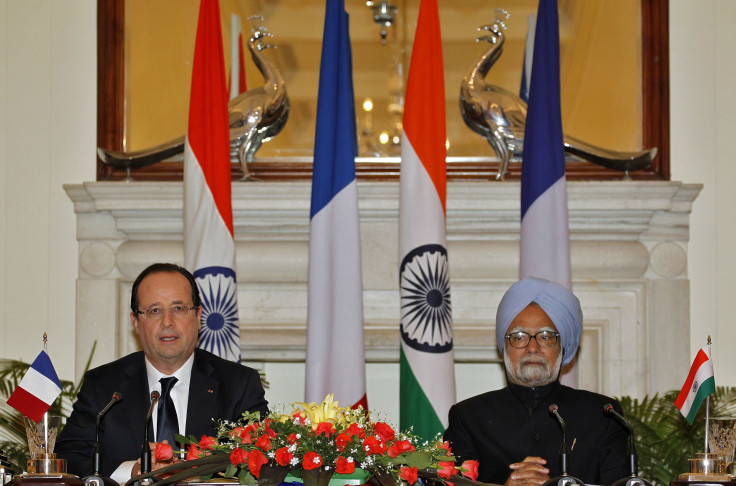Hollande In India: France And Other Western Powers Eager To Sell Arms To New Delhi

During French President Francois Hollande’s two-day visit to India, his principal task will be to convince Indian Prime Minister Manmohan Singh’s government to cough up $12 billion for 126 Rafale fighter jets, in one the biggest defense deals in global history.
Joined by a delegation of top French government officials, including Foreign Minister Laurent Fabius and Defense Minister Jean-Yves Le Drian, as well as business leaders, including Dassault Aviation’s (PINK: DASTY) Chief Executive Eric Trappier (whose company makes the Rafale jets), Hollande’s itinerary includes stops in the capital Delhi and commercial hub Mumbai.
“I am sure that this visit will see our relationship at the best level we can hope,” Hollande told reporters in English in Delhi.
“We come from a great partnership, India and France, and we must always improve the relationship between our two countries. India is a great democracy, the biggest democracy of the world, a country which is developing, and France must be with you in this challenge.”
The Indian foreign ministry also underscored Delhi’s increasingly important ties with Paris.
“Our relations are growing fast in all sectors … in economic, industrial and commercial spheres,” an Indian foreign ministry official said, according to Agence France Presse, but cautioned that no big announcements are likely to be made during Hollande’s Indian sojourn.
The sale of the Rafale jets, which are still in negotiations, remains at the heart of France’s current push in India, which is now the world’s largest arms importer. The chief of the Indian air force, Shashi Prakash Tyagi, recently said the Rafale deal could close by the middle of this year.
Indian officials have stated that the path toward finalizing the Rafale sale is “proceeding smoothly,” while Prime Minister Singh himself said he is optimistic the sale will be completed.
But Hollande and his fellow French luminaries are likely following the saga of Finmeccanica (PINK: FINMF), the Italian defense contractor whose $753 million contract to sell helicopters to India may be scuttled by charges of corruption and kickbacks. (Tyagi himself has been accused of receiving bribes in connection with the Italian transaction.)
Moreover, India recently said it plans to reduce its defense expenditures by 5 percent due to the economic slowdown the country is undergoing, raising more doubts about the scope of New Delhi's commitment to continuing its military buying spree.
“The Finmeccanica corruption investigation, and India’s recent announcement that it will temporarily reduce its defense spending budget by $2.6 billion creates uncertainty for some global defense contractors,” said Jamie Chandler, a political scientist at Hunter College in New York City.
“Last year, aerospace analysts predicted that India's push to upgrade its equipment would be a major source of industry growth. India wants to source some manufacturing to its domestic defense industry, but those companies are not in a position to provide heavy weapons, i.e., tanks, fighter jets and helicopters.”
Chandler indicated that in the event the Finmeccanica contract really is cancelled, the most likely beneficiaries would be Boeing (NYSE: BA) of the U.S. and France’s Dassault.
“The Indian government has promised that Boeing's current contracts will be unaffected by the corruption scandal,” he noted.
Indeed, Boeing is currently bidding to sell 22 Apache Helicopters and 15 Chinook heavy-lift helicopters to the country. Last year it sold India four C-17 heavy-lift aircraft, the first of which was delivered last month.
The UK could also benefit – in fact, Prime Minister David Cameron is planning a high-profile trade mission to India next week. Britain is home to the world’s second biggest aerospace industry, although AgustaWestland, a major British helicopter maker, would be out of contention since it is a subsidiary of Italy’s Finmeccanica.
Chandler points out that the Indian defense sector is no stranger to corruption either – it has historically been plagued by kickbacks and bribery scandals. During the 1980s, for example, the government of Prime Minister Rajiv Gandhi collapsed over the discovery that Swedish gun manufacturer Bofors paid bribes to supply howitzers to the Indian Army.
“Given India's ongoing corruption problems, most major defense contractors have likely built this dependency into their strategic growth plans, and they will continue to make an aggressive push to win Indian defense contracts,” Chandler added.
While the Rafale sale remains pending, France is pursuing other military and high-tech projects with India -- including an ambitious $9.3 billion, 9,900-megawatt nuclear power plant to be built in the Western Indian state of Maharashtra by France’s Areva (EPA: AREVA).
Originally envisioned by France’s former president, Nicolas Sarkozy, the Areva nuclear plant program has encountered stiff opposition from environmentalists, particularly in the wake of the Fukushima disaster in Japan almost two years ago. The New Delhi government, meanwhile, said it remains committed to the endeavor.
While Western Europe and the U.S. continue to duke it out for Indian’s lucrative defense contracts, an old friend of New Delhi – namely Russia – appears to be losing favor.
Alexander Fomin, the chief of Russia's Federal Military-Technical Cooperation Service, who led Russia's delegation at the Aero India show outside Bangalore last week, conceded that India is purchasing fewer arms and hardware from Moscow than in prior years.
The Stockholm International Peace Research Institute (SIPRI) estimated that as recently as the 2006-2010 period, 82 percent of India’s arms imports originated in Russia.
© Copyright IBTimes 2024. All rights reserved.





















